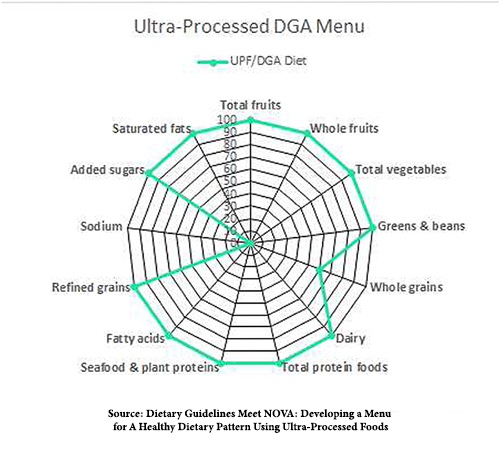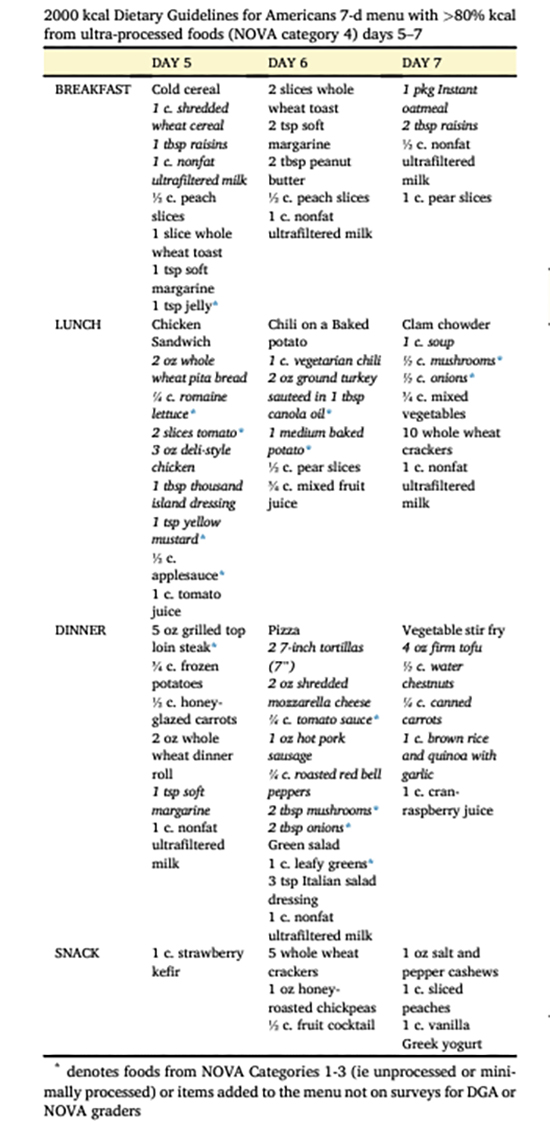The study set out to create a 7-day menu of roughly 2000 calories aligned with the Dietary Guidelines for Americans (DGA) while providing more than 80% of its calories from ultra-processed foods (UPFs). The definitions of what constitutes a UPF is based on the NOVA classification, perhaps the most widely used definition of food based on processing. [1]
The researchers first identified foods that reflected both DGA recommendations and our typical food choices. The later data came from a compilation of food choices from the National Health and Nutrition Examination Survey (NHANES). The ten most consumed categories yielded 200 varying food items. Those defined by NOVA as ultra-processed were then used to create that 7-day diet. A diet sample can be found at the end of this article.

- 91% of all calories in this diet are UPFs
- 22% of calories come from protein, 54% from carbohydrates, and the rest from fats
- The diet was within guidelines for saturated fats as well as added sugars.
- The only nutrients below guidelines were Vitamin D and E
- Dietary quality was measured by the 2015 Healthy Eating Index [2]. The score was 86, equivalent to a “B.” For comparison, lower scores are “unhealthier,” and the average American dietary score is 56. (D+?)
“NOVA is not useful for determining the healthfulness of either individual foods or dietary patterns when current DGA recommendations are used as context to indicate healthfulness. … NOVA scores are not proxy markers for dietary quality.”
That quotation comes from the discussion of the study by its authors. While this should lay to rest the myth that the nutrient value of foods is based on how they are or are not processed, it will not. As the authors go on to point out, based on surveys of the American public,
- 20% “believe that minimal processing is an important determinant of healthy food,” 39% believe foods without artificial ingredients are “somewhat or highly likely to be healthier than a product that does contain artificial ingredients.”
- Consistent with the Dunning-Kruger effect, where individuals with low knowledge in a particular domain tend to overestimate their competence, 52% of respondents “indicate they are knowledgeable about the DGA.”
- The average Healthy Eating Index for Americans remains stubbornly at 59 and “have not changed substantially” since they were developed in 1995.
“Encouraging Americans to avoid UPF seems unlikely to improve diet quality.”
Nearly three decades of cajoling, labeling, taxing, educating, blaming, and shaming have not moved the American diet closer to guidelines. Our National Institutes of Health is the largest funder of nutritional research spending $1.9 billion in 2020. Are we really getting our money's worth?
[1] Foods are considered un- or minimally processed, a culinary ingredient, processed, or ultra-processed food. You can read more about NOVA here.
[2] The Healthy Eating Index (HEI) is a scoring system developed by the US Department of Agriculture to determine how well-aligned food choices are with dietary recommendations.

Source: Dietary Guidelines Meet NOVA: Developing a Menu for A Healthy Dietary Pattern Using Ultra-Processed Foods Journal of Nutrition DOI: 10.1016/j.tjnut.2023.06.028




